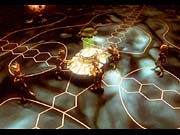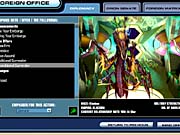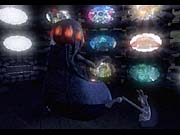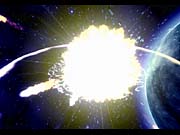Master of Orion III Q&A
Our interview with Master of Orion III producer Constantine Hantzopoulos reveals new information about the game, including news of a delay.
The Master of Orion series has a long history dating back to 1994, when the first game was released and set the standard for modern space empire games. It's been quite a while since the second Master of Orion game was released in 1996, and Master of Orion III's designers at Quicksilver haven't been content to just do a graphical update of the earlier formula. While some of the team's ambitions were refocused when the game went through a major overhaul earlier this year, the new game will still have quite a few new features when it's released in a few weeks.
Master of Orion III is in the homestretch, and we recently caught up with the game's producer at Infogrames, Constantine Hantzopoulos, to find out the latest details on the project as it nears completion.

GameSpot: A lot has happened with Master of Orion III since Quicksilver shifted gears on the project earlier this year. Tell us, where does the game stand right now?
Constantine Hantzopoulos: We've been at art asset lock now for about three weeks and hit feature completion two weeks ago. We're just nailing down the last of the few crash bugs related to multiplayer, still doing some minor tuning on the user interface, and continuing to make minor tweaks to game balance. We are very close.
GS: There's been some talk about the release date slipping again. What's a realistic date to expect to see the game on shelves?
CH: Well, the game could go out right now, but unfortunately players would hit a few multiplayer crash bugs. I believe quality should be paramount, so we're going to hold the game until it's ready. We've missed our dates, but it's critical to have the multiplayer work out of the box.
It became clear to me a while back, when there was a lot of pressure to ship the game in November, that we would have to cut the multiplayer to ship the game in time, and then release it in a patch after game was out. I didn't want to do that. Of course, there'll be a patch. That's the way things work. But I want the patch to be about enhancements to the game based on players' feedback.
GS: Bottom line, is it going to miss the holiday season?
CH: I wouldn't say that. We just have a few more weeks of regression testing ahead of us. After making changes, we freeze the code and play the game all the way through. That's the only way to be sure a game is actually absolutely free of major bugs. Master of Orion III is a beast to test, with all the permutations to play through.
GS: What have been the biggest challenges as you've been approaching the feature-complete milestone?

CH: Making all the game's parts work within the whole and presenting it in an easy-to-understand fashion. Master of Orion III is very deep and allows you to play the game you want to play. It does not paint you into a corner by making you follow a linear path of play during your journey, and there's almost always an out of a particular sticky situation (and multiple at that). Balancing all that is, to put it bluntly, a gargantuan task.
In a way, Master of Orion III is a very personal experience. You are creating and telling your own story as you play--similar base experiences yet uniquely different approaches are what these kinds of games are all about. Talk to 10 people about a similar base experience, say going to war, and they'll each give you 10 different answers on how they dealt with it: Spies. Sanctions. Embargo. Enforced peace. I crushed them all. Total war via Senate bill. Complete space combat/planetary bombardment smack down from the (really large) New Orion Fleet (which also happens to start with just about every tech).
GS: What are some of the components in the game that have most changed in recent months?
CH: If by components you mean features, not much--just lots of tuning and balancing. We did our big overhaul last February and ever since then have been working towards seeing that vision through.
Space Combat
GS: We heard earlier this year that the game's interface was extensively streamlined. How would you describe the interface at this point?
CH: It's very easy to use, and there's not much guesswork going on. We had a couple of axioms we used after we revamped: "Never more than two clicks away from where you want to be and if at all possible one click" and "Never leave the player guessing as to what is going on that turn--leave them thinking about it."

In Master of Orion III, you always know exactly what is going on in your empire for that turn without having to dig for the information, no matter how large the game scales up. You can call that info up at any time with a keystroke, and what's more, if you need to change that build queue on Ceti Alpha V or put down that revolt on Dantooine or check out that special in Valhalla, you can get there with one click of the mouse and change it or take total command for a few turns and then give it back to the AI or, at a high level, set a template for development. Which leads to another of our maxims: "Let the AI do its job but let the player intercede and take total control at any time--if they want to."
GS: How have the game's graphics evolved over time?
CH: We've done lots to improve the eye-candy appeal, from awesome planetary bombardments to cutscene events to enlarging ships in space combat and overhauling the special effects. Master of Orion III is quite an attractive game. On the galaxy map, a 3D galaxy with pulsating wormholes, glowing starlanes, and twinkling stars are just some of the minor touches. Space combat may start out slow (hey, one scout ship versus another scout ship does not make for a very exciting battle), but by the time you've amassed armadas, it's a proverbial lightshow: Orbitals slowly rotate around their planets (a great offensive tactic is to keep them on the far side if you can; they won't shoot through a planet), missiles and huge beams fire from planetary bases, fighters streak across and swarm capital ships. It's all in 3D, just locked to a rotatable, zoomable, pitchable 2D plane.
GS: We haven't seen much on the tactical ship combat. Is there anything new to report on that?
CH: We've been purposely holding that under wraps until we felt it was compelling enough to show. From a functional point of view, it is working exactly as we originally intended it to--real time, yet slow and tactical. The way you put your task force together plays a very important role. It's no longer about having the biggest ship and loading it up with the latest weapons--put one leviathan (the largest hull size) with the best tech against a swarm of lancers (the smallest hull size) with equal tech, and it's like a piranha vs. a cow.

Since all ships are designed to fulfill a mission, roles like long-range attack, short-range attack, point defense (shoot down missiles and fighters), carriers (launch fighters that fulfill either CAP or escort roles), indirect fire, planet destroyers, even recon all play an important and significant role in how you do battle. I liken it to a WWII Pacific naval engagement. Go in without picket and escort ships or without point defense or fighter cover, and you're going to get creamed no matter how buff your core ships are. You also cannot put your biggest ships in a picket or escort "screen," because picket and escort screens all have a hull size cap. If you bring troop ships for invasion, you better be prepared to defend them in space combat, because those are what the AI are going to try to get to first. Kill the troops, and there's no invasion.
You can also retreat some or all of your ships from battle. It's not a fight to the death, and it has that gut-wrenching Privateer-style tension. It takes a few seconds for your ships to warm up for the jump out, and in that time frame, you may lose none, some, or even all of them, depending on the circumstances. I'll let the screenshots do the talking for the visuals.
Multiplayer
GS: What is the game's multiplayer like? How long do you expect multiplayer games to last? Does multiplayer have the same endgame goals as the solo campaign?
CH: Multiplayer is vicious. It's also where diplomacy, coupled with the emphasis model, really comes into play. I'll also lump the Orion Senate into that category, as players can vote on laws that can bend or break the rules of the game for a set amount of time. For example, the ban on chemical weapons prevents players from using chemical weapons for a set number of turns, and if ignored, diplomatic relations with other empires go down on a per-turn basis, and unrest goes up.

Other wonderful things like imposing sanctions and embargoes against other member empires or initiating and voting on isolation or even Senate expulsion all play a factor via bills. You can publicly tell empires you "like" them via a praise bill, and that may or may not improve your relations with them, so next turn you can get that research agreement you want. Think of it as a mini-UN with the New Orions as the galaxy's peacekeepers and law enforcers.
Spying is also quite fun, as you can wreak havoc in many different ways. And of course, you can always lay down the smack with a huge fleet if you are so inclined. What's more, if you have an alliance--either defensive or full--you can use your allied partners' forces in battle. Turn processing is simultaneous--it's not I go, you go. We all go at the same time. If the deficit spending game option is turned on, the longer it takes for you to take your turn, the more interest you pay on your deficit. You can also set up "speed chess" timed turns, ranging from 1- to 10-minute drill-style play. When time is up, turn is over. This works for single-player too.
Multiplayer games last as long as you want. You can play, retire for a while, and pick up where you and your friends left off by loading a saved game. You can play on a small map for a quick game, or you can play in a huge spiral galaxy, which will take you weeks to finish. Lastly, multiplayer victory conditions are the same as the single-player game: solving the Antaran X mystery, getting elected Senate president, or ending up as the sole superpower.
GS: How have beta testers reacted to the game? Are there particular suggestions that you're working in?

CH: We take the feedback of our testing program (both internal and external) very seriously. A lot of suggestions that were expressed by the testers have gone into the game. Their help has been truly invaluable. As to their reactions, well, I can honestly say that we have a lot of pleased people on our hands. People aren't going to bed and are scheming ways to play at work or even blow off work. That's pretty good.
GS: Is there anything else you'd like to add?
CH: Yes. The sound design for the game is quite excellent. Shameless plug to both Brian Williams for the great thematic musical score--each race has their own "cultural" music--and DSonic for the awesome sound effects for space combat, planetary bombardment, and ground combat. They simply rock.
GS: Thanks for your time, Constantine.
Got a news tip or want to contact us directly? Email news@gamespot.com
Join the conversation